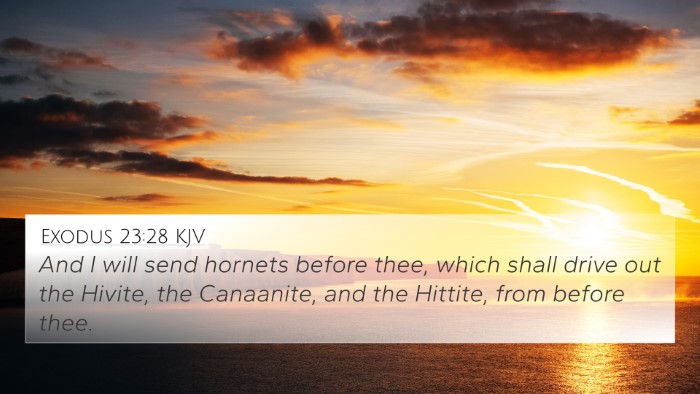Understanding Deuteronomy 6:19
Verse Reference: Deuteronomy 6:19 - "To cast out all thine enemies from before thee, as the Lord hath spoken."
Summary of Meaning
This verse highlights God's promise to His people regarding the destruction of their enemies as they enter into the Promised Land. It reflects themes of divine assistance and the fulfillment of God's covenant promises. The importance of obedience is emphasized, for the success of the Israelites relied on their adherence to God's laws and commands.
Insights from Commentaries
-
Matthew Henry:
Henry emphasizes that God’s deliverance of the Israelites from their enemies is a sign of His faithfulness. The verse serves both as an assurance of victory and a reminder to the people of their responsibility to remain faithful to God's commandments.
-
Albert Barnes:
Barnes points out that the casting out of enemies symbolizes spiritual warfare and the need for God's intervention in times of conflict. He explains that true success comes from relying on God, illustrating a deeper principle of dependency and trust in God's power.
-
Adam Clarke:
Clarke interprets this passage in light of God's unchanging nature, noting that the promise made signifies a broader spiritual struggle. He views it not only as historical but as applicable to believers today, highlighting the continuation of God’s support against spiritual adversaries.
Cross-References to Deuteronomy 6:19
This verse connects profoundly with several other scriptures, reinforcing its themes through cross-references:
- Exodus 23:22: God's assurance of fighting against enemies when obedience is maintained.
- Joshua 23:10: A promotion of strength in the face of adversaries with the promise of God's support.
- 2 Chronicles 20:15: God fights the battles of His people, encouraging reliance on Him.
- Psalm 44:5: The victory won through divine strength and favor.
- Romans 8:31: "If God is for us, who can be against us?" - a New Testament affirmation of God's protective promises.
- 1 John 5:4: The victory of faith over the world resonates with the divine promise covered in Deuteronomy.
- Hebrews 13:5-6: Assurance of God’s presence and help in times of trouble reinforces the message of trust found in this verse.
Thematic Connections
Deuteronomy 6:19 serves as a thematic bridge connecting various Biblical principles, such as:
- Obedience to God's law as a prerequisite for divine victory.
- The assurance of God's involvement in the believer's battles.
- The historical context of God's covenant with Israel and its implications for contemporary faith.
- The spiritual application of reliance on God in overcoming both physical and spiritual enemies.
Comparative Analysis
When performing a comparative Bible verse analysis, the interconnectedness of these themes provides a rich study of faith and divine intervention. One might explore:
- How Deuteronomy 6:19 relates to the greater narrative of the Israelites' conquest.
- The role of prayer and obedience in achieving victory, as seen in other Bible verses.
- The influence of these promises in the New Testament context, reflecting on Jesus promising spiritual victory over sin.
Cross-Referencing Tools and Methods
Utilizing a cross-reference Bible study can enhance one's understanding of this verse by:
- Employing a Bible concordance to locate related themes and verses.
- Using a cross-reference Bible study guide for thematic connections.
- Engaging in inter-Biblical dialogue, examining how differing scriptures reinforce a unified message of faith.
User Intent Considerations
For those seeking to understand what verses are related to Deuteronomy 6:19, the connections can lead to significantly deeper insights into faith, obedience, and divine provision. Examples include:
- What themes connect Deuteronomy 6:19 with New Testament assurances?
- Exploring how similar messages appear throughout the prophetic books.
- Finding cross-references for historical contexts versus contemporary application.
Conclusion
In summary, Deuteronomy 6:19 encapsulates vital messages of divine promise, faithfulness, and the importance of obedience in spiritual warfare. Its rich theological implications can be fully realized through diligent cross-referencing and contextual study.






